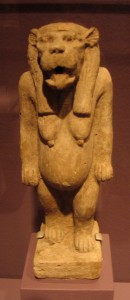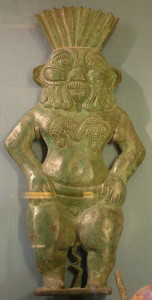Pharaoh and the Crafty Midwives
So, after putting out Context for Kids episode #13 where I talked about the Ordeal by Water attested to in several Assyrian and Babylonian law codes, one of my parents asked me about the midwives and Pharaoh’s first attempt to kill the Hebrew males through them–well, the midwives’ trickery is an amusing tale once you know exactly what Pharaoh believed and how the midwives used it against him. People ask me why I study ancient Egypt and this is an example of why. I have never seen it taught before but to me it just makes perfect sense based on their religious beliefs.
Whereas the goddess Hathor was believed to be responsible for the conception of children, it was two lesser known deities who were responsible for protecting both woman and baby in childbirth–Ta-weret and Bes. I call them the midwife’s best friends.
Ta-weret (image credit), depicted as a hippopotamus with a crocodile’s tail, was the embodiment of the two great dangers of the Nile and as the consort of Bes, was responsible for helping women in labor. She was known as the protector of the child Horus (this will be important later). (click on the link above if you want to see a very cool article on the finding of a Bes vessel in an archaeological dig of Persian-era Israel. They were like gargoyles)
Bes (image credit), her consort, was depicted as a dwarf or pygmy and was purposefully made hideous with an amalgam of silly features for the purpose of scaring away demons, snakes, or anyone else that would harm a baby – and later served as the child’s friend. He was considered a comforting presence. I chose this particular image because you can see him resting on the “s-z” symbol, which represents protection. Bes is also associated with protecting the child Horus.
So these two, in the eyes of Pharaoh, were the deities responsible for the protection of mother and child and the blessing of the birthing process. The Pharaoh who “did not know Joseph” gave the Hebrew midwives an ultimatum.
Ex 1:16 And he said, When ye do the office of a midwife to the Hebrew women, and see them upon the stools; if it be a son, then ye shall kill him: but if it be a daughter, then she shall live.
What an unthinkable situation to be in! Yet the brave midwives refused to obey Pharaoh and when he figured it out, he calls them back in. What is their response and why does it work?
Ex 1:19 And the midwives said unto Pharaoh, Because the Hebrew women are not as the Egyptian women; for they are lively, and are delivered ere the midwives come in unto them.
In the eyes of Pharaoh, this casts reasonable doubt on the justice of what he is doing; he is faced with the possibility that the gods might not be on his side. Ta-weret and Bes were quite possibly assisting the women in laboring too quickly for the midwives to show up and kill the male babies.
His solution to the problem is to resort to another test–the ancient River Ordeal spoken of in the codes of Hammurabi (1750 BCE #2 and 132), Ur-Nammu (2100 BCE #13 and 14), and in Middle Assyrian Law tablet A (1076 BCE #17, 22, 24 and 25).
The River Ordeal, or Trial by Cold Water, reflected the concept that if you throw someone into deep water and they survive, then the gods saved them, but if they drowned it was because the gods killed them. Don’t laugh, they would think you were ridiculous too if you told them that the sun is really a self-contained nuclear reaction instead of Amun-Re rowing his solar boat across the sky. It’s all a matter of what is normally accepted as fact and we aren’t any quicker to give up the ridiculous stuff we want to believe either. (I mean, if, for every time I passed a magazine that said Jennifer Aniston was having a baby, she actually had a baby–she would have her own country right now and yet people swear by those magazines. Whenever they are wrong they just move on to the next fabrication in order to keep selling more magazines “1984” style lol)
So, let’s just say that Pharaoh, who absolutely believed in the authority of his gods, got a second opinion. If Bes and Ta-weret were helping the Hebrew women, the river would not take the babies. After all, Ta-weret represented the two most fearsome threats of the Nile – the Hippopotamus and the Crocodile. She saved baby Horus from Set, so if she was responsible then he would find out.
Although the midwives’ trickery was an amusing success in pulling the wool over Pharaoh’s eyes (it would definitely have been in the eyes of Moses’s audience), the exposed babies did not survive the River Ordeal–save one. Moses survived. When Pharaoh’s daughter pulled him out of the river, she would have likened it to the story of Horus being saved by Ta-weret from Seth. She, and later Pharaoh, would have seen this child as having been judged innocent by the gods and under the specific protection of Ta-weret and Bes.
Spanish Version here
Image Credits:
“Tawaret figurine (Boston MFA)” by Madman2001 – Own work. Licensed under CC BY-SA 3.0 via Commons – https://commons.wikimedia.org/wiki/File:Tawaret_figurine_(Boston_MFA).jpg#/media/File:Tawaret_figurine_(Boston_MFA).jpg
“Egypte louvre 012”. Licensed under CC BY-SA 1.0 via Commons – https://commons.wikimedia.org/wiki/File:Egypte_louvre_012.jpg#/media/File:Egypte_louvre_012.jpg
References:
Martha T Roth, Law Collections from Mesopotamia and Asia Minor
Richard H Wilkinson, The Complete Gods and Goddesses of Ancient Egypt
Barbara Watterson, The Gods of Ancient Egypt
Donald B Redford, The Ancient Gods Speak: A Guide to Egyptian Religion

